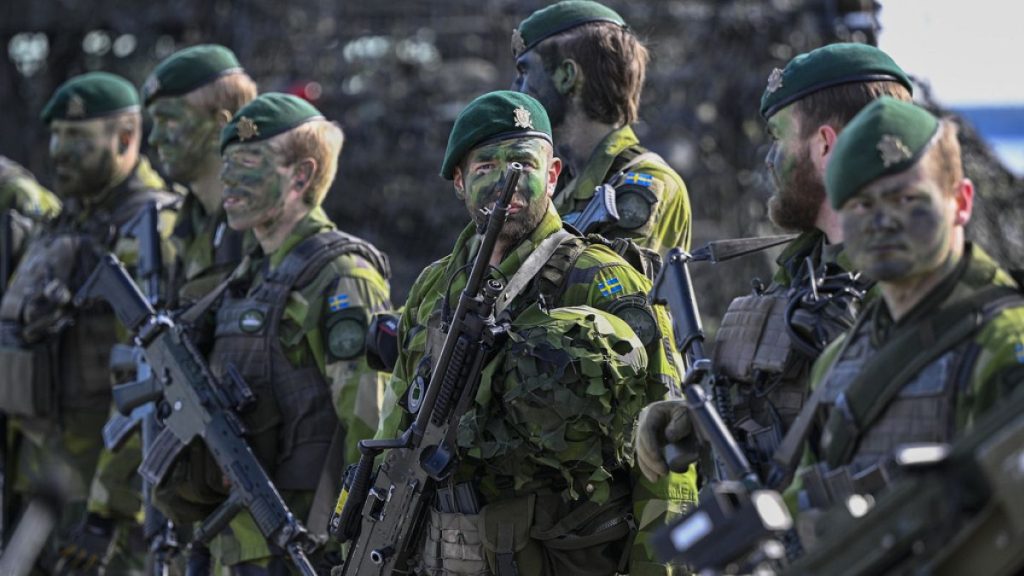The arrival of hundreds of Swedish troops in Latvia marks a significant milestone in Sweden’s commitment to NATO and the collective defense of its eastern flank. This deployment, the largest since Sweden joined the alliance, underscores the evolving security landscape in Europe following Russia’s invasion of Ukraine and highlights the growing importance of multinational cooperation in maintaining regional stability. The troops, comprising a mechanised infantry battalion, arrived in Riga, the Latvian capital, under the escort of Swedish air and naval forces, as well as Latvian naval units. Their mission is to bolster NATO’s deterrence and defense capabilities, contributing to a broader effort to ensure peace and security in the region.
Latvia, sharing borders with both Russia and Belarus, finds itself on the front lines of heightened tensions stemming from the ongoing conflict in Ukraine. The presence of the Swedish battalion, integrated into a Canadian-led multinational brigade, serves as a tangible demonstration of NATO’s commitment to defending its member states and deterring potential aggression. This deployment signifies not only Sweden’s dedication to fulfilling its alliance obligations but also the growing cohesion and resolve within NATO to address the challenges posed by Russia’s actions. The arrival of these troops marks a new chapter in Sweden’s security posture, transitioning from a history of neutrality to active participation in collective defense.
The deployment represents Sweden’s most substantial operational contribution to NATO since its accession in March 2023. This move, ending decades of post-World War II neutrality, reflects a fundamental shift in Swedish security policy driven by the altered geopolitical reality in Europe. Russia’s invasion of Ukraine served as a catalyst for Sweden, as well as its neighbor Finland, to reconsider their long-held non-alignment stances and seek the security guarantees provided by NATO membership. The Swedish battalion’s integration into the Canadian-led brigade highlights the interoperability and collaborative nature of NATO operations, demonstrating the alliance’s ability to effectively deploy and integrate forces from different member states.
The Swedish contingent will be stationed near Adazi, outside Riga, joining one of eight NATO battlegroups positioned along the alliance’s eastern flank. These battlegroups serve as a forward presence, demonstrating NATO’s commitment to the defense of its eastern members and providing a rapid response capability in the event of a crisis. The deployment of the Swedish troops contributes to the strengthening of this forward presence and enhances NATO’s ability to deter potential aggression. The strategic location of these battlegroups underscores the alliance’s focus on maintaining stability in a region increasingly vulnerable to security threats.
The historic nature of this deployment is not lost on the Swedish troops. For Lieutenant Colonel Henrik Rosdahl, commander of the 71st Battalion, the mission represents both a momentous occasion and a transition to a “new normal.” His words capture the sense of both pride and pragmatism surrounding Sweden’s evolving role within NATO. The deployment reflects a shift in mindset, recognizing the need for active participation in collective defense as an integral part of Sweden’s security strategy. It marks a departure from traditional neutrality and embraces the shared responsibility of alliance membership.
Sweden’s decision to join NATO, alongside Finland, reflects a broader trend of European nations reassessing their security postures in the wake of Russia’s aggression in Ukraine. This shift underscores the enduring relevance of NATO in providing security and stability in a complex and unpredictable geopolitical environment. The arrival of Swedish troops in Latvia symbolizes the concrete manifestation of this renewed commitment to collective defense and the strengthening of the alliance’s eastern flank. It represents a significant step in integrating Sweden into the NATO framework and solidifies the alliance’s resolve to deter further aggression and maintain peace in the region. It marks a turning point for Sweden.














